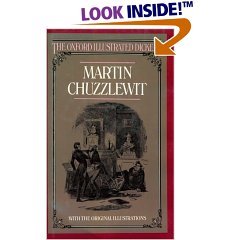Martin Chuzzlewit
 I hesitate to say write anything about this book by Charles Dickens because I do such a poor job of reviewing what I read, generally sticking to such witty and erudite communications as, "Umm, it's a really good book!" Or, "Bad book. Burn it."
I hesitate to say write anything about this book by Charles Dickens because I do such a poor job of reviewing what I read, generally sticking to such witty and erudite communications as, "Umm, it's a really good book!" Or, "Bad book. Burn it."However, I'm very sorry I waited so many years to read this book. It is delightful! I generally describe Dickens's works as urban, dark, and filled with grotesque caricatures. They are enjoyable because he weaves so many subplots together and creates so many mysteries in each book, yet still manages to settle it all neatly and solve each mystery by the end of the book. I'm sure that writing in serial form helped, because each chapter always ends in such a way as to leave the reader anxious to read the next chapter.
I avoided this book because I knew part of the story was set in America, and I could not imagine a Dickens novel with an American setting. I should have gotten over that prejudice sooner. His caricatures of the Americans are hilarious and I'm sure I've actually lived in that swampy, dismal "Eden" he describes.
This story takes place in a village (not London, although the characters make trips to London and the last part of the action takes place there) and is lighter and funnier than most of the other fiction by Dickens. The characters are not such caricatures that they aren't recognizable as someone I might know. The story is marvelous, and two of the characters have to be the best Dickens ever thought up and put on paper.
There are various subplots and minor characters woven in and out, but the basic story is this: Martin Chuzzlewit, Sr., an elderly, wealthy gentleman, is ill and all his relatives - both close and distant - gather to jockey for position as the one who loves him best, thus deserving to inherit his riches. Martin is no fool, and is disgusted by these vultures. He has attending him a young, orphaned woman, whose sole job is to care for him. He has made known to her that as long as he lives, she will be provided for, but when he dies she gets nothing. His grandson, Martin, Jr., is in love with the girl, Mary, and this angers the old man. Harsh words are exchanged between grandfather and grandson, and each quits the company of the other, vowing to have no more contact.
One of the distant relatives is Mr. Pecksniff. He's odious, but not as odious as Dickens could have made him. Sycophantic, but not as sycophantic as Uriah Heep. Falsely pious - but I am ashamed to admit some of his actions and words could have come from me. Pecksniff is a major character in the book, and his rise and ultimate downfall - which he nevers acknowledges, believing himself to be saintly and correct in all his doings, even when unmasked and revealed to all - was the backbone of the story.
Dickens also created two of the sweetest, best men in this story: Mark Tapley and Tom Pinch. Both are selfless, compassionate, and kind to all. No act of mercy or grace is too small for either of them, and Tom is a paragon of virtue for always seeing and believing the best about anyone and everyone. Mark never complains, no matter the circumstances, but finds cause for rejoicing in every trial. They are what I as a Christian should strive to be.
At the end of the book old Martin Chuzzlewit sums up the fatal flaw in his family that caused all sorts of mayhem (including murder) - love of self.
"The curse of our house," said the old man...."has been the love of self; has ever been the love of self. How often have I said so, when I never knew that I had wrought it upon others!"
Good book. Read it.
Labels: books, reading lists


4 Comments:
I think I will! Thanks.
Thank you for your review. I have never even heard of this book.
doh.
Sounds really good!
I've only just read David Copperfield, and am eager to meet more characters like Uriah Heep. Deliciously awful. Will be reading Martin later this year.
I've had this book for years now, but it's so thick that I just haven't gotten to it. Your review has inspired me to give it a try one of these days.
Post a Comment
Subscribe to Post Comments [Atom]
<< Home